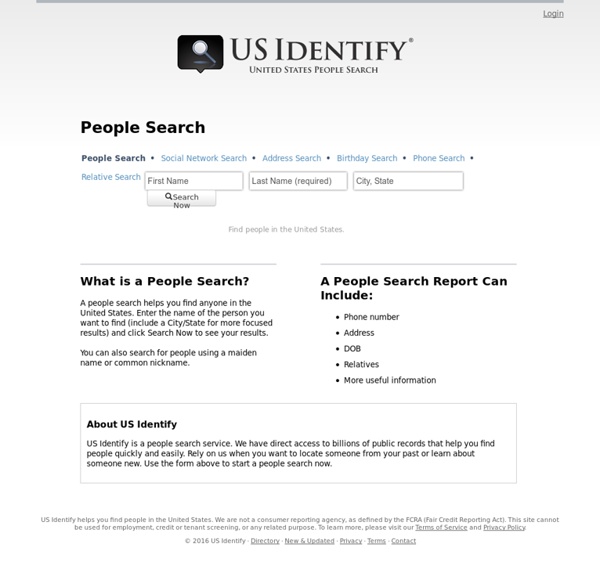



People Search - Free People Search Engines & People Finder. Find People Free, Locate People and Search People Free. Google A Person - Google People Finder & Google People Search. Person Search, Person Locator, Person Finder and People Searches Online. Persopo 100 Useful Tips and Tools to Research the Deep Web By Alisa Miller Experts say that typical search engines like Yahoo! and Google only pick up about 1% of the information available on the Internet. The rest of that information is considered to be hidden in the deep web, also referred to as the invisible web. So how can you find all the rest of this information? Meta-Search Engines Meta-search engines use the resources of many different search engines to gather the most results possible. SurfWax. Semantic Search Tools and Databases Semantic search tools depend on replicating the way the human brain thinks and categorizes information to ensure more relevant searches. Hakia. General Search Engines and Databases These databases and search engines for databases will provide information from places on the Internet most typical search engines cannot. DeepDyve. Academic Search Engines and Databases The world of academia has many databases not accessible by Google and Yahoo! Google Scholar. Scientific Search Engines and Databases Science.gov.
Obituary Searches - How to Use the Web for Obituary Searches You can find nearly anything on the Web; however, obituaries, published daily in nearly every newspaper around the world, aren't so easy to find online. In fact, since most newspapers do not publish digital archives of their papers online, finding obituaries usually ends up being a (gasp!) offline research task. In this how-to, I'm going to give you a few pointers you can use to start your obituary search on and off the Web. Difficulty: Average Time Required: Depends on what you're looking for Here's How: In order to make your obituary searches as efficient as possible, you'll need to have this information available before you get started: last name first name place of residence place of death date of death Also, because most obituaries are initially printed in newspapers, it would be extremely helpful if you knew the name and location of the newspaper in which the obituary was printed, as well as the date (the date won't necessarily be the date of the person's death). Tips: What You Need
List of academic databases and search engines From Wikipedia, the free encyclopedia This article contains a representative list of notable databases and search engines useful in an academic setting for finding and accessing articles in academic journals, institutional repositories, archives, or other collections of scientific and other articles. Databases and search engines differ substantially in terms of coverage and retrieval qualities.[1] Users need to account for qualities and limitations of databases and search engines, especially those searching systematically for records such as in systematic reviews or meta-analyses.[2] As the distinction between a database and a search engine is unclear for these complex document retrieval systems, see: the general list of search engines for all-purpose search engines that can be used for academic purposesthe article about bibliographic databases for information about databases giving bibliographic information about finding books and journal articles. Operating services[edit] [edit] [edit]
SearchSystems.net - The Largest Free Public Records Directory ERIC – World’s largest digital library of education literature Obituary Daily Times (GEN-OBIT) Search Welcome to The Obituary Daily Times web site! Français Mailing List Archive PUBLICATION LIST OBITUARIES ON THE WEB (Canada) The Obituary Daily Times is a daily index of published obituaries. The Obituary Daily Times mailing list is intended mostly (but not only) for Family Historians, researchers and compilers (ex. researching all of ONE FAMILY). WE DO NOT HAVE THE ACTUAL OBITUARIES. We would like to send our gratitude to everybody at Rootsweb, for hosting our mailing list, and our web page. You can subscribe through email Rootsweb by sending a message to: GEN-OBIT-L-request@rootsweb.com no subject is needed. Being a contributor implies a few very simple tasks: a) Submitting an index of your local paper's obituaries b) Occasionally answering a query for more information on an obituary you have indexed. First read the Relevant Contributor Handbook for manual data entry; for ObitFiler 1.06 (Old Version); or for ObitFiler 2.01 (Java version) For training contact Jan Plambeck Jan Plambeck
99 Resources to Research & Mine the Invisible Web College researchers often need more than Google and Wikipedia to get the job done. To find what you're looking for, it may be necessary to tap into the invisible web, the sites that don't get indexed by broad search engines. The following resources were designed to help you do just that, offering specialized search engines, directories, and more places to find the complex and obscure. Search Engines Whether you're looking for specific science research or business data, these search engines will point you in the right direction. Turbo10: On Turbo10, you'll be able to search more than 800 deep web search engines at a time. Databases Tap into these databases to access government information, business data, demographics, and beyond. GPOAccess: If you're looking for US government information, tap into this tool that searches multiple databases at a time. Catalogs If you're looking for something specific, but just don't know where to find it, these catalogs will offer some assistance. Directories